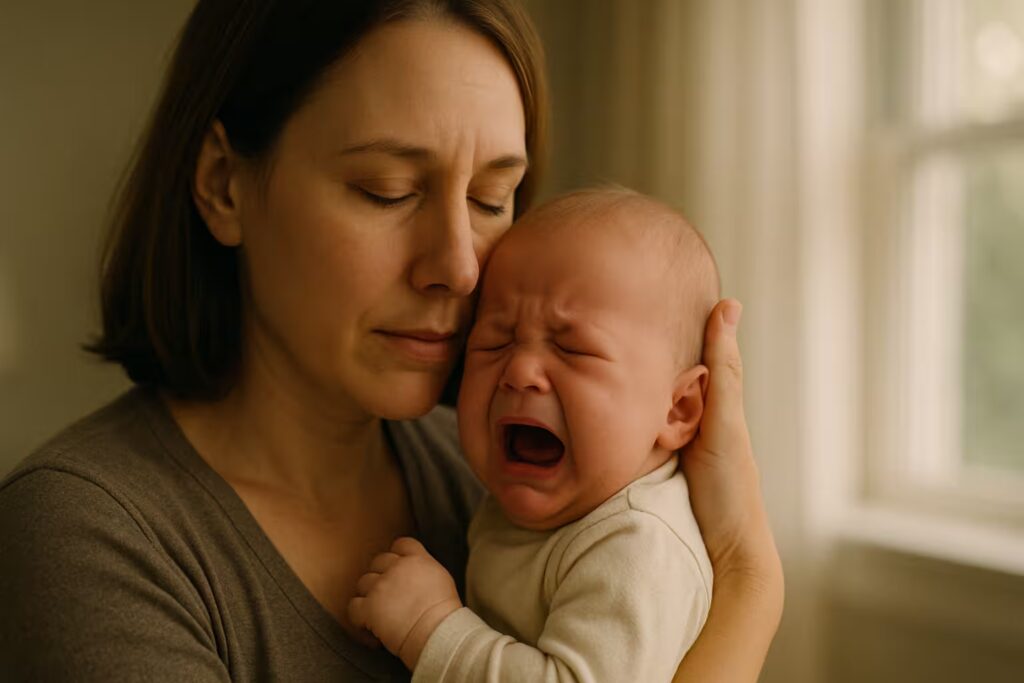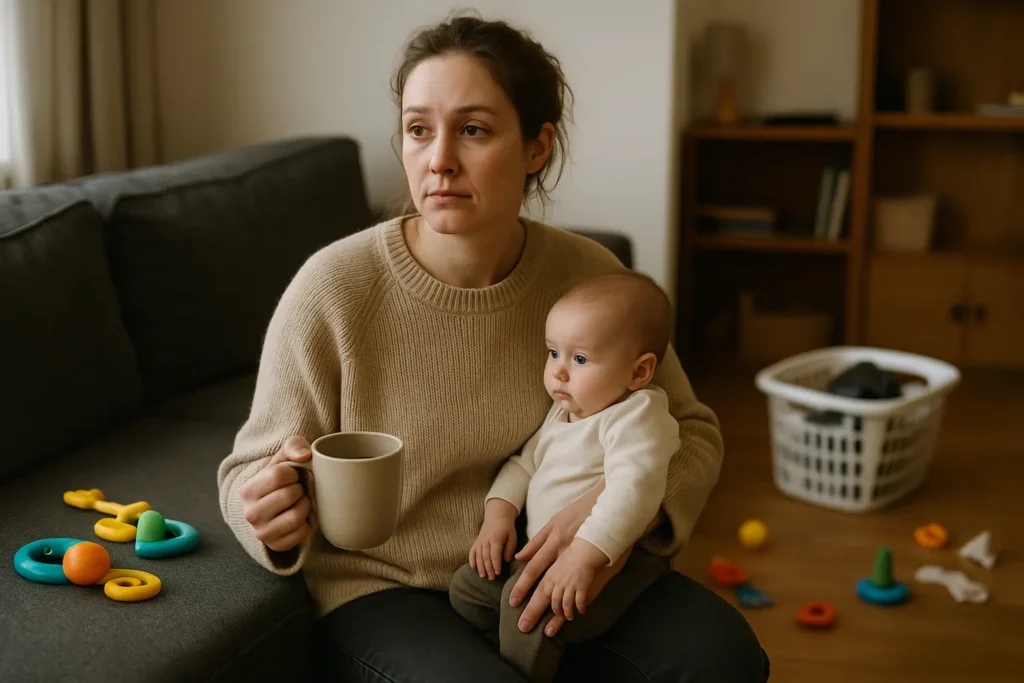When Baby Crying Becomes a Mystery Sport

Colic, overtiredness or just plain fed up?
There’s a special kind of noise that comes from a baby who Just. Won’t. Stop. Crying.
Not hungry, not dirty, not cuddled into silence, just inconsolable. 🤷♀️
It’s the Olympic-level riddle no one signed up to solve: is it colic, overtiredness or has your baby just hit their daily limit on life?
Let’s untangle the big three, so you’re not left second-guessing yourself at 3 am.
1. Colic: The Cry That Won’t Quit
Colic isn’t a diagnosis, it’s a label. A label for when your baby cries for hours and no one (including your GP) can really explain why. It usually starts around week 2 and peaks at 6–8 weeks. Like a very loud, very stressful phase.
How to spot colic:
- Crying for more than 3 hours a day, at least 3 days a week, for 3 weeks (yes, it’s literally the “rule of 3s”)
- Crying often ramps up in the late afternoon or evening.
- Baby goes red in the face, clenches fists, arches back, pulls knees up.
- They might fart a lot (like, a lot)
What helps:
- White noise (vacuum cleaner, hairdryer, or one of those Spotify playlists made by a sleep-deprived genius)
- Rocking, baby-wearing, or bouncing on a yoga ball like it’s your cardio class
- A warm bath or gentle tummy massage (clockwise, always)
- Infant probiotics. Worth asking your GP or child health nurse
- And sometimes, nothing helps… and that’s not your fault
If you’re dealing with suspected colic, remember this: it’s not forever. Most colicky babies outgrow it by 12 weeks. You just need to get through the storm.

2. Overtiredness: The Sleep Spiral
You’d think tired babies would just sleep, right? Ha. No. An overtired baby gets so revved up that they can’t switch off. Cue: grizzling, thrashing, full-blown meltdowns.
Signs your baby is overtired:
- Short, rubbish naps
- Rubbing eyes, pulling ears, zoning out
- Suddenly very clingy or resisting sleep altogether
- Cries harder the longer they’re awake
What helps:
- Watch their awake windows (newborns can only handle 45–90 mins at a time)
- Catch the early tired signs — don’t wait for the cranky red alert
- Create a wind-down routine: dim lights, cuddles, soft voice
- Swaddle (if they’re still in the age range for it) or try a sleep sack
- Resettle in a dark, quiet room with shushing or rocking
Overtiredness can look like colic, but it’s often more predictable. Once they’re in a better sleep rhythm, the crying usually eases.
3. Just Plain Fed Up
Here’s the thing: babies are people. Tiny ones, but still. And just like us, they get bored, overstimulated, lonely, or need a change of scene.
Common “fed up” triggers:
- Too much noise, light or fuss.
- Being passed around like a pass-the-parcel.
- A day full of visitors or outings.
- Wanting contact but not full-on engagement.
What helps:
- Switch it up, go outside, walk around the house, pop them in a carrier
- Skin-to-skin isn’t just for newborns
- Less stimulation, soft voices, calm space, no TikTok scrolls blaring in the background
- Sometimes, they just need to have a whinge. You don’t have to fix every second of it.
This kind of crying tends to ebb and flow. It’s not hours on end, just little bursts of “I’ve had enough now, thank you.”
When Should You Worry?
If your gut says something’s off, call your GP, midwife or child health nurse. Always.
🚨 Call a doctor urgently if:
- Your baby has a fever (over 38°C if under 3 months)
- They’re not feeding properly or seem floppy
- Their cry suddenly changes, or they’re unusually quiet
- You see signs of dehydration (fewer wet nappies, dry lips, sunken fontanelle)
You are never “overreacting” by getting help. Full stop.
What If It’s All of the Above?
Babies are complex little onions. There’s often more than one reason behind a crying jag. They can be overtired and gassy and just generally peopled out. And you? You’re doing your best.
You’re allowed to step away for a breather. Pop them in a safe space, take a few deep breaths, call your partner, mum, mate, whoever’s in your corner.
And remember: this doesn’t mean you’re failing. It means you’re parenting.
Ever had a baby cry for what felt like days on end? What helped (or didn’t)? Share your story below. Your words might be the lifeline another mum needs today.






Responses